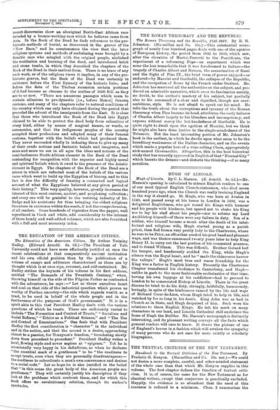HUGH OF LINCOLN.
Hugh of Lincoln. By C. L. Manion. (E. Arnold. 3s. 6114—Mr. Marson's opening is calculated to attract English readers to one of our most typical English Church-statesmen, who died seven hundred years ago, when the Church was really training England in the way it ;should go. St. Hugh, who was born at Avalon in 1140, and passed away at his house in London in 1200, was a delightful Englishman, who got round his Kings with humour and his people with kindness, but spared not to shake his King nor to lay his staff about his people—nor to rebuke my. Lord Archbishop himself—if there were any failure in duty. Son of a soldier, who himself became a monk after the death of his intel- lectual and religions wife, Hugh started young as a parish priest, then fled from a very pretty lady to the Chartreuse, where he rose to be Prior, an office that needed his good head and pleasant ways, and was thence summoned twenty years later to help King Henry IL to carry out the last portion of his commuted penance, and to found Witham. This was difficult, Brother Gerard lost his temper, and handsomely scolded the King, while Hugh's silence won the Royal heart, and he " made the rhinoceros harrow the valleys." Hugh's most true and warm friendship for the King was a factor in English history. Presently the Chartreuse Chapter transferred his obedience to Canterbury, and Hugh— unlike in garb to the more fashionable ecclesiastics of that time, having his own luggage at his saddlebow—had to proceed to London to be consecrated Bishop of Lincoln. There in the great diocese he tried to do his duty, strongly, faithfully, humorously, lovingly, in spite of the hindrances caused by the life and ways of Richard Cceur-de-Lion, whom Hugh tried to help in life, and watched by for so long in his death. King John was as bad in Church as in State, and Hugh despaired of him. Such were his relations to these English Kings. He left his mark on many characters in our land, and Lincoln Cathedral still enshrines the fame of Hugh the Builder. Mr. Marson's monograph is distinctly interesting, and its pleasant writing conveys all the facts which general readers will care to know. It draws the picture of one of England's heroes in a fashion which will awaken the sympathy of many persons who do not care for mere saintly or scholarly biographies.






























































 Previous page
Previous page